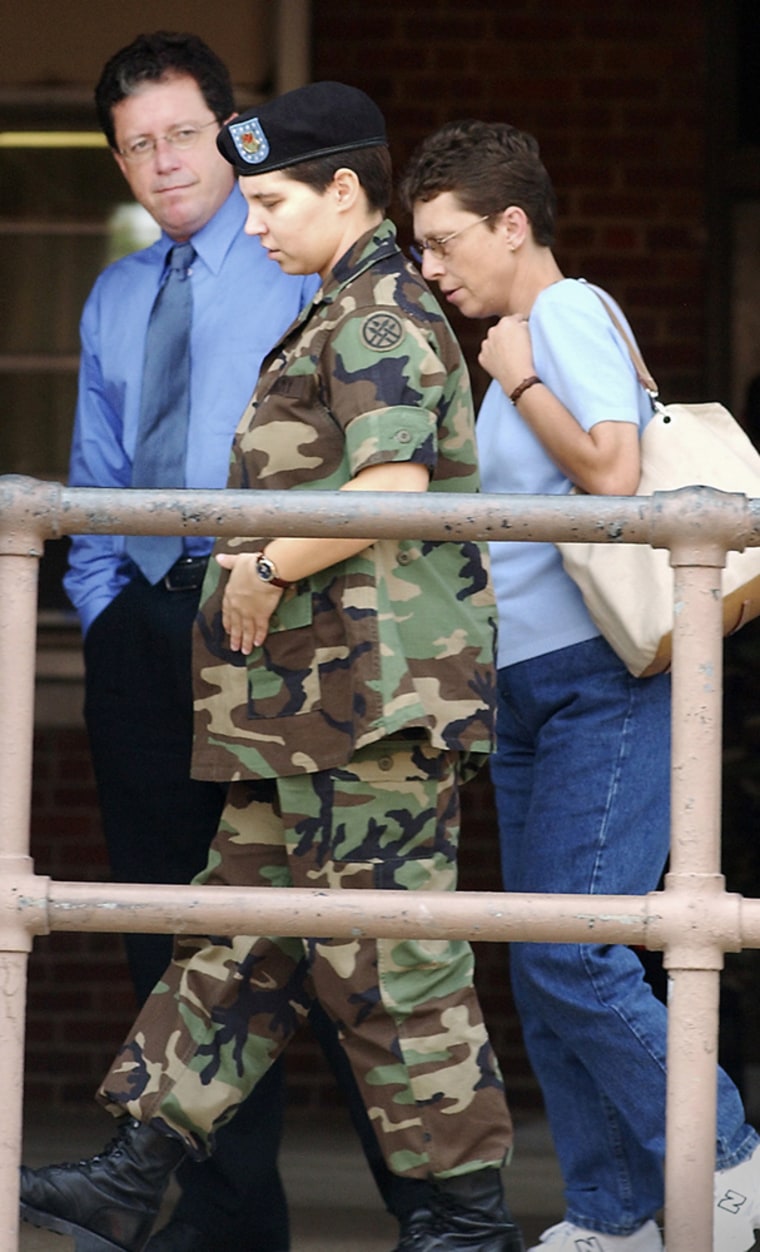Prosecutors ended a military court hearing Tuesday for a soldier shown in infamous photos of naked Iraqi prisoners by requesting an additional charge of “maltreatment and cruelty” against Pfc. Lynndie England.
The hearing to determine whether England should face a full court-martial adjourned without testimony from any of the high-level witnesses sought by the defense, including Vice President Dick Cheney and Defense Secretary Donald Rumsfeld.
Investigating officer Col. Denise Arn said she would recommend within a week whether England should face a court-martial.
During closing arguments at Fort Bragg, Capt. Crystal Jennings, a military prosecutor, read from the 21-year-old Army reservist’s own statements that she stepped on prisoners’ toes and posed for and took photos of naked detainees piled in human pyramids and being forced to simulate homosexual acts.
‘She was having fun’
“She was having fun,” Jennings said. “There was no indication that she was there for any military purpose.”
The defense has said England and other members of the Maryland-based 372nd Military Police Company abused prisoners under orders from military intelligence agents to “soften up” prisoners for interrogation.
Civilian defense attorney Rick Hernandez said outside court that with all the recent reports about problems in military prisons, “obviously Pfc. England was not acting alone.”
But Jennings said there was no evidence England ever was given an order to mistreat prisoners. In fact, Jennings said, England repeatedly violated orders to stay out of the part of the prison where the abuse occurred.
“If she was given an order, it was an unlawful order” that England was obliged to disobey, Jennings said. “She was not an MP. She was a (personnel) clerk ... who was not recruited into some secret mission. She was there to have some fun.”
Infamous photos
England is the woman shown in now-infamous photographs holding a naked Iraqi prisoner by a leash, smiling and pointing at a hooded detainee’s genitals and posing behind a pyramid of nude Iraqis.
The Fort Ashby, W.Va., native, reportedly eight months pregnant with the child of another soldier charged in the scandal, has attended all but a few hours of the hearing, stepping out briefly on the opening day to visit her obstetrician.
Military officials have recommended charging her with 13 counts of abusing detainees and six counts stemming from possession of sexually explicit photos not involving detainees. If convicted, she could get up to 38 years in prison.
Jennings also told Arn she should recommend an additional charge of maltreatment and cruelty against England. The charge serves as a catch-all to encompass all the individual acts England is accused of and would carry an additional penalty of up to one year in prison and a dishonorable discharge.
Defense attorney questions charges
In a brief defense summation, Capt. Jonathan Crisp, England’s military attorney, objected to the additional charge and noted that one count accusing England of photographing abuse involves a picture another soldier has admitted taking.
After the hearing, Crisp said it was unusual for prosecutors to recommend charges during closing arguments. But he said the defense was expecting it.
The Article 32 hearing is the rough equivalent of a civilian grand jury, except England was allowed to be present and to call and cross-examine witnesses. Arn heard from 27 witnesses over five days of testimony in early August and two days this week.
England’s lawyers had sought to call more than 160 witnesses, ranging from military interrogators up to Cheney and Rumsfeld. By Tuesday, that list had been reduced to just six names, including Brig. Gen. Janis Karpinski, who was in charge of Abu Ghraib when the abuse scandal broke out.
But Arn rejected those requests, saying Karpinski’s testimony would not be relevant. She also refused a defense request to hear from several Iraqi prisoners after the prosecution argued that it would require soldiers in armed convoys to transport these witnesses through fire zones to testify.
Arn will make her report to Col. Richard Hooker, commander of the 18th Airborne Corp’s Dragon Brigade. Hooker will then recommend to Lt. Gen. John R. Vines, Fort Bragg’s commander, whether England should be court-martialed, and on which charges.
One soldier has already pleaded guilty in the abuse scandal and is serving a year in prison. Another is set to enter a guilty plea in October.
